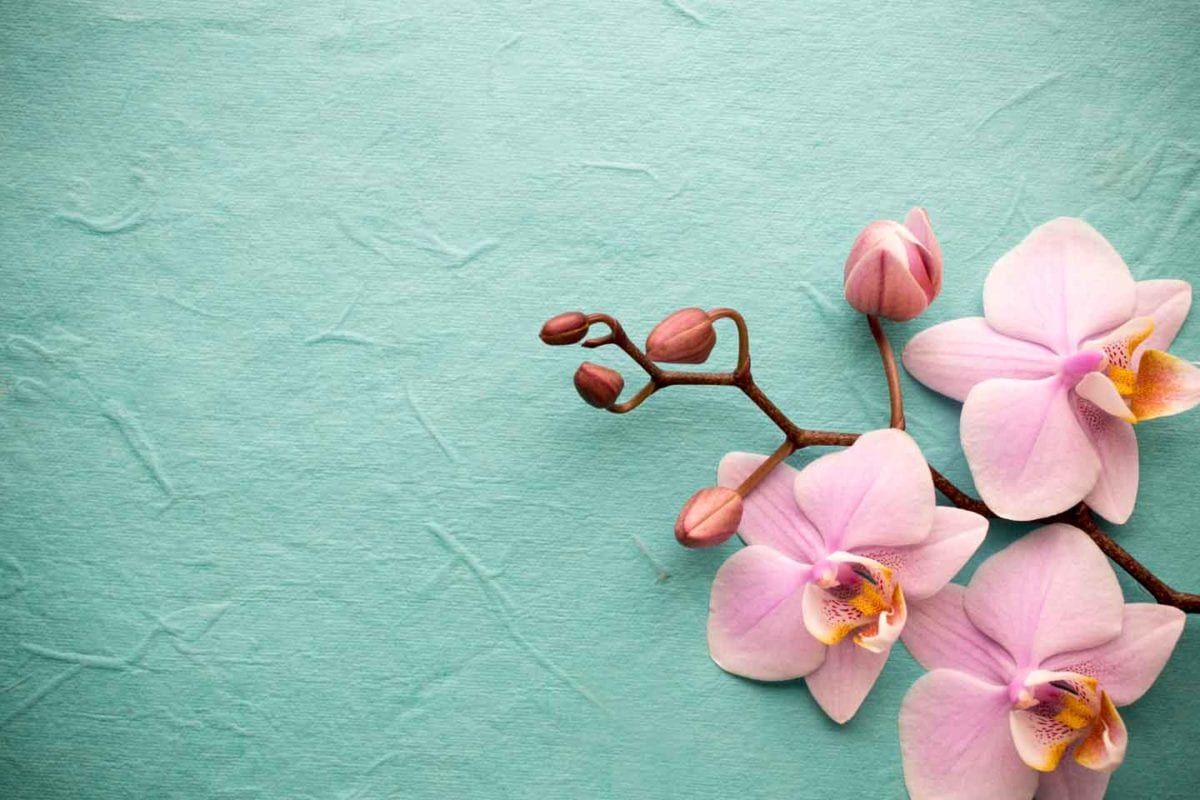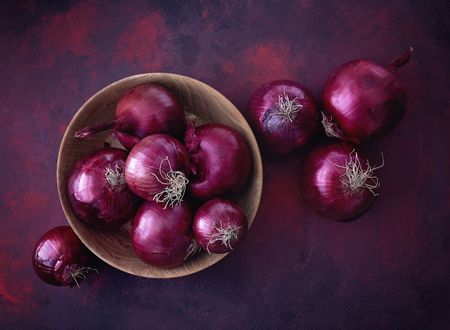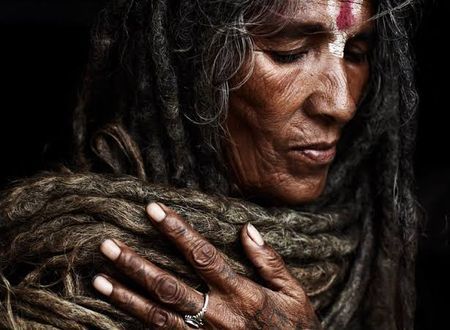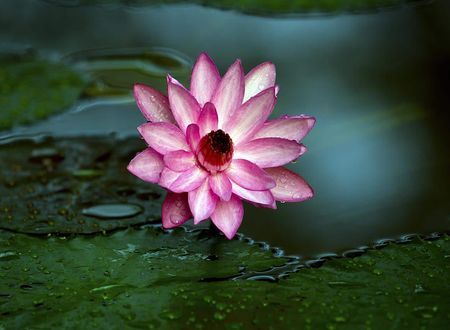A quote usually attributed to Buddha says, “Pain is inevitable but suffering is optional.” What a profound statement!
There is no suffering if you can let go. Pain becomes immaterial in the absence of suffering. I am reminded of a story I had come across a while ago. As follows:
After a day of preaching and alms, two fellow monks, brimming with youth, of more or less the same age, with one being more senior, were returning to their monastery while the sun was returning to its abode. Firmly established in their conduct, they would walk with their heads down and glances scanning not beyond two feet. Those were the days of the monsoon and the gods seemed happy as it had rained generously that day too. The valley was green and puddles of water looked like patches of random art on the unpaved roads. Their monastery beautifully set in the magnificent mountains was past a rivulet, barely six feet wide, that would have a strong water current during the monsoons.
Naturally, they had to cross the rivulet to get to the monastery. As they arrive at the bank of the river, they see a beautiful young woman, white like the pearlescent snow-capped mountains of the valley, with a softly radiating face like the morning sun, standing there still but somewhat anxious. They exchange glances; the senior monk understood that the young lady was afraid of crossing the swollen rivulet.
Without any verbal communication and with no further ado, he gets closer to the feminine idol and gently picks her up in his arms. He crosses the river and puts her down, even more gently, on the other side of the river. She bows in gratitude and respect before making tracks towards her home.
The younger monk is somewhat troubled by the actions of the senior one. Out of veneration and respect, however, he stays quiet. The two monks continue walking towards their destination. Silence persists for a good few hours before it is broken by the junior monk.
“Can I please ask you a question, if I may?” he mutters.
“Yes, of course,” the elder one replies.
“According to our code of conduct, we are not allowed to touch a woman.” His statement fails to hide the immanent question hiding in it.
The senior monk says, “Yes, indeed.”
The younger one finally asks, “So, how come you carried that young woman across?”
“I did not carry the woman, I simply lifted the one in need,” the elder one says, adding, “besides, I left her on the other side of the river and you are still carrying her, brother.”
Most people do not want to let go, many others, do not know how to. On the journey of self-transformation, under the practices of mental transformation, the next post in the series will highlight the practice of letting go. Stay tuned.
Peace.
Swami
Editorial Note
They say “Suffering is optional” but is it?
You’re going to get hurt, and you’re going to suffer. That’s just life. Life is suffering. Pain and suffering are two unavoidable parts of the human experience, but they don’t have to be something we fear. They can be opportunities for growth if we learn how to approach them in the right way—and a means by which we can become stronger people.
Pain Vs. Suffering
It is impossible to live without pain, but we can learn to live with it. Pain is unavoidable in life, just as death and taxes are unavoidable. But there is no reason why you can’t endure some degree of pain if it means being able to enjoy a fuller life.
Pain and suffering are two different things: pain comes from the body; suffering is something we create when we attach meaning to an external event or condition. When you interpret your pain, then you experience suffering. For example: “I have knee pain because I am old,” or “I have knee pain because I’m overweight,” or even something like “I’m not going to be able to play basketball anymore.” These interpretations cause us distress that adds unhappiness on top of our physical discomfort (pain).
Suffering Vs. Struggle
Suffering is a choice. You make it every day, and there’s no way around it. When you don’t accept what is happening—when your mind rebels against the present moment—you struggle, resulting in suffering.
When your mind resists what is happening at this moment, you struggle. The mind fights against reality and tries to change reality to suit itself. This resistance causes friction in the body and mind, creating discomfort that eventually leads to pain and suffering.
This kind of suffering can appear anywhere: at home or work, on vacation or while traveling, with family or friends, alone or surrounded by people who love us dearly but don’t understand our pain (or who we think won’t understand).
When there’s a conflict between how things are versus how we want them to be, there are two choices: accept what’s happening as part of life or resist it as part of life. Then either let go of resistance as quickly as possible (for example, by letting go of anger) or hold onto resentment for more extended periods until its toxicity seeps into our bodies over time until something gives way under too much pressure (like an ulcer).
Embrace What is
When you stop fighting everything, you’re able to embrace what is. We can’t stop the rain from falling or the sun from setting, but we can make sure our umbrellas are in the car and that we don’t forget to bring our sunscreen on a picnic at dusk. The same applies to emotional pain: it will happen no matter what; it’s not something you control or have power over—it just happens! It would help if you accepted this reality to start healing yourself and letting go of any unnecessary suffering that comes with it.
If your emotions are out of control due to stress or some other external force (like an argument), try calming down by taking slow breaths through your nose while counting from ten down one at a time until you feel relaxed again.
Or, if overthinking an event only makes things worse, try writing down all your thoughts on paper, so they aren’t stuck inside your head anymore! With each thought written down onto paper (including those negative ones), imagine putting them into an envelope addressed “Letting go” and mailing them off somewhere far away–maybe even outside Earth’s atmosphere–so they’ll never come back again…
Embrace being uncomfortable, and stop trying to find comfort in all the wrong places.
One of the greatest gifts you can give yourself is to be open to discomfort.
It may seem counterintuitive, but it’s one of the most liberating things you can do for personal growth and happiness. The way pain is inevitable, but suffering is optional; the same applies here: suffering from discomfort is optional.
We all have habits that help us avoid discomfort, and we sometimes use these habits to shield ourselves from intense experiences or difficult emotions. But they also limit us in many ways by preventing us from growing as individuals (and, as a result, making our lives less happy). Here are some common examples:
- Avoiding difficult conversations or situations with other people
- Lying to yourself about your thoughts and feelings (e.g., “I’m fine!”) –
- Using substances such as food or alcohol to numb out pain instead of dealing with it directly (this is called self-medicating)
Suffering usually comes from not accepting “what is.”
Acceptance and patience are key to happiness. Most suffering comes from not accepting “what is.”
What is, is what it is. That’s the first step to happiness. You can’t change what happened in the past or how others behave—you can only change yourself!
Pain comes from always wanting things to be different than they are, whether that’s your job location or relationship status, or something else entirely. If we accept life situations, our lives will be better because we’ll stop fighting reality and start living with it instead of against it!
Not everyone suffers in the same way. Learn how you suffer and work on changing your habits and thought processes. No matter how you suffer, it’s important to remember that everyone suffers in different ways. And while everyone feels pain and sadness, not all of us can cope with our emotions in healthy ways.
The first step is learning what makes you suffer from working on changing your habits and thought processes. Suppose you feel like making a change after reading this article. Take some time to reflect, and don’t hesitate to seek help! Your doctor, therapist, or os.me free helpline is available for you.
Accept That Life Isn’t Fair
The world is unfair, and people are mean. Sometimes bad things happen to good people, and sometimes it feels like nothing ever goes your way. But here’s the secret: life isn’t supposed to be fair! Life is about the choices we make in response to the circumstances we find ourselves in, so even when things seem unfair, there’s always something that you can do about it—accepting your situation or making an effort towards change.
You may not have control over everything that happens around you or within yourself, but one thing that every human being controls is their reaction to what goes on around them (and within themselves). So instead of letting yourself get bogged down by negative emotions like anger, fear, and sadness—which only bring more pain into your life—focus on being positive instead!
Take steps towards achieving whatever goals matter most for YOU rather than dwelling on what everyone else thinks should be vital (because chances are those two things won’t match up). Happiness comes from within; if we let outside factors dictate our level of joy, then we’re just going through life blindly instead of consciously creating our happiness each day anew.
Conclusion
The key to mental toughness is knowing that you are in control of your thoughts and emotions. You can choose not to suffer. You can choose to be happy.
Takeaway: Life brings struggles, but suffering does not have to be one.
Frequently Asked Questions on “Pain is inevitable, suffering is optional”
If suffering is optional, does that mean we suffer out of choice?
We suffer when we are unable to handle ourselves, our emotions, and our circumstances. When we continue to suppress our thoughts and feelings, they hit back with vengeance one day. And, their attack is brutal, often resulting in not just sapping one of their mental energy but robbing them of their sanity altogether. Read more here.
If suffering is optional, then how to overcome suffering?
When you remain oblivious to the goodness, beauty and divinity in your life, or if you don’t selflessly devote a portion of your time to a cause, life is then forced to hand you the third perspective: suffering. It may come as acute boredom, deep sadness, severe depression or a wake-up call in the form of great personal loss. Whether you want to go with the first, second or third option, the choice is yours. Read more here.
When pain is inevitable how do I stay graceful in a situation?
Perhaps suffering could be looked upon differently. Maybe like a season, a passing phase. “I don’t deserve suffering” is a statement Nature does not understand and “Why me” is a question it does not answer. Therefore, if we truly wish to get past a sense of suffering, we’ll have to focus on some other dimension of it. Read more here.
If suffering is a choice, why am I not able to make happiness a choice?
Your actions fill your day and your days make up your life. It’s as simple as that. Excessive or negative thinking, being lazy or a workaholic, these are just habits. I would say even being jealous is a habit, for, a jealous person will find one reason or another to repeatedly experience (and justify) this emotion. It’s remarkable how much of what we think and do is driven by our habits. Read more here.
Why is pain and suffering an intricate part of our lives?
Suffering from pain comes from always wanting things. When you begin to accept that anything can happen to anyone, including you and I, another question starts to plague the mind: “Why me?” I get to hear so many terrible stories of suffering that you really are forced to question what anyone could have done to deserve this in their lives? And whatever it was that they did, could it be not forgiven by nature or God or the universe or whoever? The truth is some questions just don’t have answers. The law of karma, of attraction, of manifestation, everything fails at times. We are only left with some theories, consolations and probabilities. Read more here.
If suffering is optional, why do good people suffer?
Good people suffer all the time. So much so, there’s almost no direct correlation between how good or spiritual you are vis-à-vis how much suffering you may have to endure in your life. Being good or great cannot protect you from physical or mental diseases if you hit the genetic jackpot, for example. Being good doesn’t mean that we can’t be hit by a truck or a drunk driver. Being good has no bearing on your stock prices or the life of your loved ones. In other words, goodness grants neither immunity from nor compensation for everything that we may deem as not good.
A GOOD STORY
There were four members in a household. Everybody, Somebody, Anybody and Nobody. A bill was overdue. Everybody thought Somebody would do it. Anybody could have done it but Nobody did it.
Don't leave empty-handed, consider contributing.It's a good thing to do today.









Comments & Discussion
5 COMMENTS
Please login to read members' comments and participate in the discussion.